| Srl | Item |
| 1 |
ID:
111026
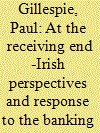

|
|
|
|
|
| Publication |
2012.
|
| Summary/Abstract |
Having enjoyed nearly two decades of economic recovery and rapid development as one of the most successful member-states of the European Union, Ireland was shocked and chastened by the global financial crisis of 2007-2008 and its traumatic impact on the country. A threefold crisis assailed its economic and political elites and citizens when the property bubble built up since 2002 exploded 6 years later. Its banking system collapsed through over-exposure to loans built up from the cheap credit made available after the euro was introduced. There was an immediate impact on state revenues when property-related windfall taxes collapsed under this pressure, exposing a yawning gap between current expenditure and revenues. And the country's economic competitiveness suffered from a runaway cost base. The paper puts these events in the context of Ireland's overall experience of European integration and its economic development. It goes on to explain how Ireland got into trouble in 2008 and tracks the major events over the next 3 years and how they were handled. Three major axes of argument about the EU/IMF rescue packages are discussed, highlighting the views of political leaders and public opinion dealing with the intensified euro zone crisis in autumn 2011. The paper goes on to assess their attitudes to EU decision-making, the role of the European Central Bank, the prospects of treaty change and Ireland's emerging position in a reconfigured Europe coming to terms with a more multi-polar world.
|
|
|
|
|
|
|
|
|
|
|
|
|
|
|
|
| 2 |
ID:
192881
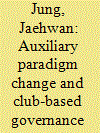

|
|
|
|
|
| Summary/Abstract |
After the 2008 global financial crisis, the newly revised Basel III international regulatory framework for banks enhanced the macroprudential objective of addressing the systemic risk inherent in financial markets. This revision of the Basel framework was lauded as an example of a paradigm change from an efficient market consensus to a macroprudential consensus in global banking regulation. However, this so-called Basel consensus merely tweaked the market-friendly nature of the Basel II framework rather than fundamentally overturning it due to the inadequacy of macroprudential ideas as an alternative paradigm. This inadequacy could be largely attributed to the manner in which global financial reforms were discussed and formulated. The club-based model of financial regulation governance enabled financial technocrats, informed by the precrisis paradigm, to maintain their privileged positions in the postcrisis reform process. Consequently, postcrisis reform proposals were built upon the existing paradigm, making the 2008 financial crisis a conservative rather than transformative event.
|
|
|
|
|
|
|
|
|
|
|
|
|
|
|
|
| 3 |
ID:
100446
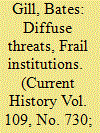

|
|
|
| 4 |
ID:
113387
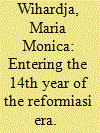

|
|
|
| 5 |
ID:
124902
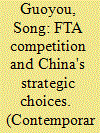

|
|
|
|
|
| Publication |
2013.
|
| Summary/Abstract |
Competition over setting up free trade agreements (FTAs) first began to heat up after the outbreak of the 2008 global financial crisis. FTAs started by developed countries are converging and China has been frustrated by exclusion. All this indicates that the developed economies are focusing on achieving their strategic goals: that is to reform trade relations, reset the game rules and redeploy economic interests. China must take appropriate measures and maintain a global multilateral trade framework.
|
|
|
|
|
|
|
|
|
|
|
|
|
|
|
|
| 6 |
ID:
113389
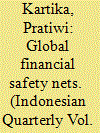

|
|
|
| 7 |
ID:
100452
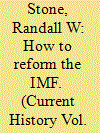

|
|
|
| 8 |
ID:
123446
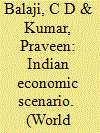

|
|
|
|
|
| Publication |
2013.
|
| Summary/Abstract |
India's economic growth gained momentum after the ushering in of liberalisation, privatisation and globalisation and most economic and social indicators improved. This scenario was jolted by the global fi nancial and economic crisis of 2007-08. CD Balaji and S Praveen Kumar take stock of the prevailing Indian economic scenario.
|
|
|
|
|
|
|
|
|
|
|
|
|
|
|
|
| 9 |
ID:
112163
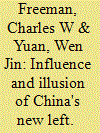

|
|
|
| 10 |
ID:
109477
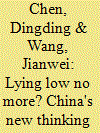

|
|
|
|
|
| Publication |
2011.
|
| Summary/Abstract |
A series of moves in China's foreign policies since the global financial crisis in 2008 seems to suggest that China is now more confident than ever in its external behaviour. Indeed, some Western observers argue that China's new confidence even borders on arrogance. Domestically, there is an emerging debate over the famous "tao guang yang hui" (TGYH) strategy. Is China beginning to behave in an arrogant way? Will China change the TGYH strategy? This article documents the evolution of the TGYH strategy and explains why there is an emerging interest in it today. It argues that the TGYH strategy will be continued as a national strategy, though some modifications to it will be highly likely in coming years.
|
|
|
|
|
|
|
|
|
|
|
|
|
|
|
|
| 11 |
ID:
111032
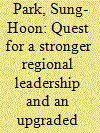

|
|
|
|
|
| Publication |
2012.
|
| Summary/Abstract |
The Korean economy has suffered two major economic crises over the past 15 years - the 1997 Asian financial crisis and the 2008 global financial crisis. After analyzing both the changes in policy environments and Korea's policy responses, the article argues that the ongoing global financial crisis provided a welcomed opportunity for Korea to increase its regional and global influence. Korea's regional leadership has been strengthened especially in promoting the "development" issue in a number of international forums and in establishing a more effective crisis-prevention framework in the Asian region. As the host country of the 5th G20 Summit Meeting in 2010, Korea initiated a number of global issues, such as "development", "global financial safety net", "green growth strategy", and has been successful in fortifying its position in the global arena. As a result, the global profile of Korea appears to have been raised both substantially and substantively.
|
|
|
|
|
|
|
|
|
|
|
|
|
|
|
|
| 12 |
ID:
133381
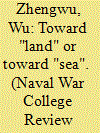

|
|
|
|
|
| Publication |
2013.
|
| Summary/Abstract |
China's maritime development having come up against pressures and challenges in recent years, the concept of "strategic hedging"-that is, pursuit of and investment in policies meant to protect the nation against the effects of geopolitical and economic uncertainty-has emerged. One of its most important proponents is Gao Bai, an ethnic Chinese professor of sociology at Duke University (in Durham, North Carolina) and the author of the article "The High-Speed Railway and China's Grand Strategy in the 21st Century" ....1 Professor Gao believes that the 2008 global financial crisis and the return, through its own strategic adjustment, of the United States to the Asia-Pacific region mean that China's "blue-water strategy" has come to an end.
|
|
|
|
|
|
|
|
|
|
|
|
|
|
|
|
| 13 |
ID:
170816
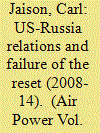

|
|
|